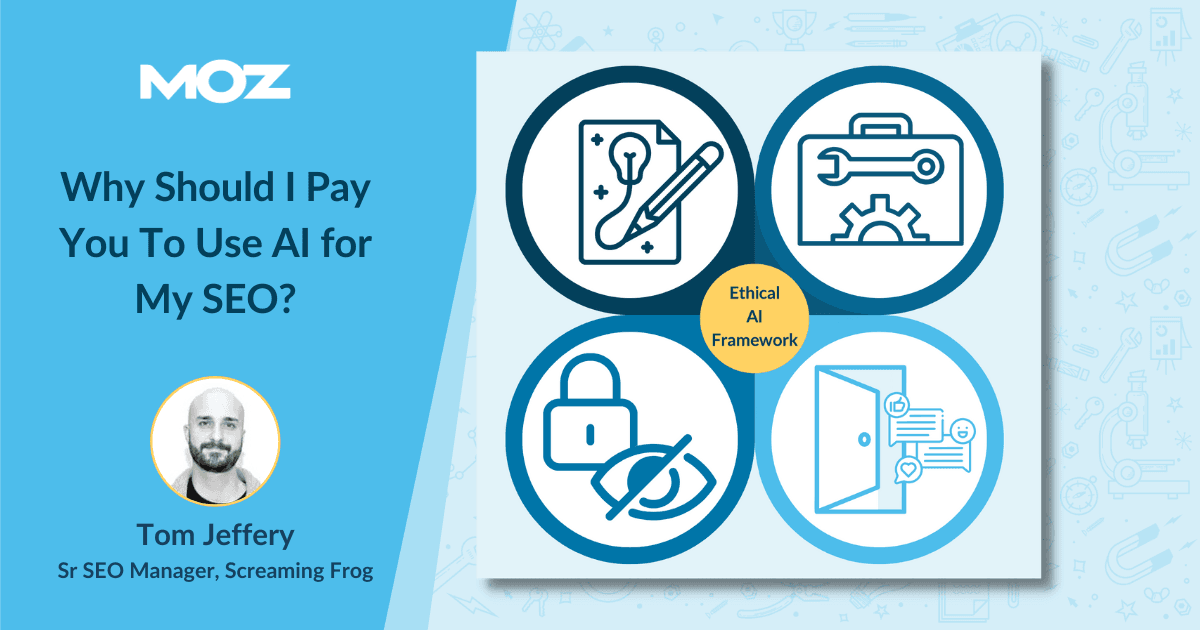I was delighted to learn that 62% of respondents already have an ethical framework. Before I get into more details, I want to define what I mean by ‘Compliance, Privacy, and Ethical Framework.’
An ethical framework ensures clients and agencies align on the approach, which helps you get buy-in. You must share this framework with clients, ideally at the onboarding stage.
A convincing AI framework should include:
1. Your approach
Split your approach between onsite SEO and offsite SEO if relevant. Give a holistic overview of how you’d typically approach using AI to support these pillars of SEO.
At this stage, listing every task you use AI for might not be necessary, but provide details on how you’d approach it. For example, your approach may be across onsite SEO to help with inspiration (perhaps across seed keywords, metadata, and more). Or, you may use AI for general data analysis, organization, and categorization.
Telling clients you use AI for ideation indicates you’re not completely reliant on AI for onsite analysis.
If you prefer to give a task-by-task breakdown, that’s your prerogative. But with SEOs utilizing new innovative AI techniques by the day, this might save you some effort to update it regularly.
Additionally, you should include a complete list of different generative AI tools you lean on. For example, this may be:
-
ChatGPT-4
-
Bard
-
MidJourney
-
Jasper
This gives clients more transparency into any tools they might have issues with or those that align with their framework.
They may even have access to AI tools you don’t, which will open up a dialogue. For example, perhaps they have ChatGPT Enterprise access, which may limit the data privacy concerns we mentioned earlier. Then, you can adjust your approach accordingly.
Also, include details on how AI impacts billing, whether through a flexible billing strategy or pre-defined project allocations based on experience using AI for similar clients.
2. Privacy assurances
Privacy assurances are a list of data you’ll never input into AI tools and are based on your knowledge of your AI tools.
For example, if you don’t have a ChatGPT Enterprise account, data privacy will be a more significant concern, and you’ll need to provide assurances on what data you won’t share. It could include:
-
Sensitive traffic & revenue data from GA, Adobe Analytics, etc.
-
Client budgets
-
Staging sites
-
Internal brand guidelines or marketing information
-
Target audiences and segments
3. Quality assurances
Be precise with your wording here, you might not need to give a comprehensive list of assurances on individual tasks, but instead of mentioning you “may use AI for content creation”, specify it’s more about helping shape content based on the tone of voice, spelling & grammar, content briefs and so on — something covered extensively within this “Make AI Your Writing Sidekick” article.
Ensure you emphasize your education with any agency-wide AI accreditations if applicable. If not, highlight that all work will undergo multiple iterations and be reviewed by experienced SEOs for quality control.
Sharing that you’re committed to staying up to date with new techniques and Google’s best practices for AI would be wise.
4. Client feedback
Leave some room for open-ended feedback or a checklist-based questionnaire on a client’s experience.
Here are some questions that are worth considering:
-
Can we use our highlighted approach for your SEO strategy?
-
Do you have any internal AI tools at your disposal?
-
Can you share AI tools during our engagement?
-
Are there any AI tools you’d like us to avoid entirely?
-
Has any AI-based work gone live that we should be aware of?
-
Do you have any further thoughts on using AI for SEO?
